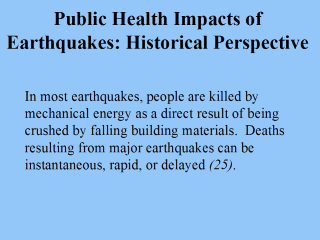 |
Instantaneous death can be due
to severe crushing injuries to the head or chest, external or internal hemorrhage, or
drowning from earthquake-induced tidal waves (tsunamis). Rapid death occurs within minutes
or hours and can be due to asphyxia from dust inhalation or chest compression, hypovolemic
shock, or environmental exposure (e.g., hypothermia). Delayed death occurs within days and
can be due to dehydration, hypothermia, hyperthermia, crush syndrome, wound infections, or
postoperative sepsis (26,27). |
